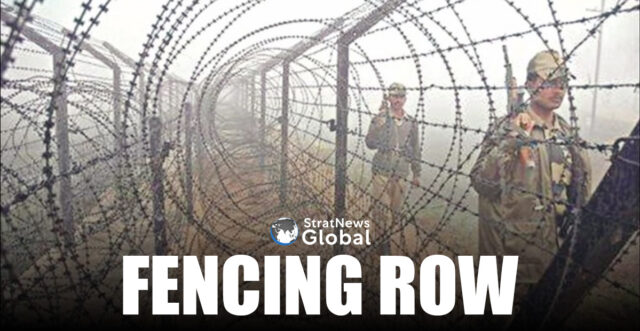The Ministry of External Affairs (MEA) summoned Bangladesh’s Acting High Commissioner to India, Md. Nural Islam, to South Block on Monday, January 13, following escalating tensions over border security measures.
This comes amidst Bangladesh’s strong objections to India’s construction of barbed wire fencing along the shared border.
An MEA release said India conveyed that all border security activities, including fencing, adhere to protocols established between the two nations. These measures, including barbed wire fencing, border lighting, and technological enhancements, aim to prevent cross-border crimes such as smuggling, trafficking, and unauthorized movements.
The developments follow a diplomatic protest lodged by Bangladesh on January 12, when its Foreign Secretary Md. Jashim Uddin summoned Indian High Commissioner Pranay Verma in Dhaka.
Bangladesh accused India of unauthorized fencing activities, particularly near the Dahagram border in Lalmonirhat, which allegedly violated international regulations prohibiting construction within 150 yards of the zero line without mutual agreement.
Bangladesh’s Concerns
Bangladesh’s foreign ministry expressed “deep concern” over these activities, stating that they disrupted border harmony and undermined bilateral relations.
In a media release, Foreign Secretary Jashim Uddin emphasized that unauthorized fencing undermines the cooperative spirit between the neighbouring nations. He also raised concerns over recent incidents, including the alleged killing of a Bangladeshi citizen by Indian Border Security Force (BSF) personnel in Sunamganj.
Bangladesh reiterated its commitment to addressing disputes through dialogue and called for adherence to existing bilateral agreements, including those prohibiting defence-related construction near the zero line without prior consent.
The construction of fences in areas such as Dahagram and Sukdevpur has faced resistance from the Border Guard Bangladesh (BGB) and local residents. While Indian villagers supported the fencing to prevent illegal immigration and cross-border threats, Those on the Bangladeshi side voiced concerns over ‘unauthorized activities’ by the BSF.
Tensions heightened last week when protests by the BGB led to the temporary suspension of fencing activities by the BSF. According to BGB officials, the construction resumed after discussions but remains a contentious issue.
India’s Position
Indian High Commissioner Pranay Verma reaffirmed India’s commitment to maintaining a crime-free border and ensuring security through cooperative efforts with Bangladesh. He emphasized that the border forces of both nations maintain regular communication and have a mutual understanding regarding security measures, including fencing.
The MEA stressed the importance of implementing prior agreements and ensuring cooperation in addressing cross-border challenges, particularly smuggling and trafficking.
Broader Implications
The border dispute highlights ongoing challenges in managing the 4,156-kilometer India-Bangladesh boundary, of which 3,271 kilometers have already been fenced. Agreements like the 1974 Land Boundary Agreement and subsequent protocols have attempted to streamline border management but remain points of contention, particularly over construction near sensitive areas like the Tin Bigha Corridor.
Both nations are expected to address these issues in upcoming director-general-level talks between the BSF and BGB scheduled for February. Diplomatic efforts are anticipated to focus on de-escalating tensions and fostering long-term solutions to prevent future conflicts.
Delhi-Dhaka relations have been strained following the ouster of Bangladesh Prime Minister Sheikh Hasina, who fled to India on August after failing to control a student revolt which turned violent, and the installation of an interim government led by Md Yunus, who has taken a clearly anti-India position.
In a career spanning three decades and counting, Ramananda (Ram to his friends) has been the foreign editor of The Telegraph, Outlook Magazine and the New Indian Express. He helped set up rediff.com’s editorial operations in San Jose and New York, helmed sify.com, and was the founder editor of India.com.
His work has featured in national and international publications like the Al Jazeera Centre for Studies, Global Times and Ashahi Shimbun. But his one constant over all these years, he says, has been the attempt to understand rising India’s place in the world.
He can rustle up a mean salad, his oil-less pepper chicken is to die for, and all it takes is some beer and rhythm and blues to rock his soul.
Talk to him about foreign and strategic affairs, media, South Asia, China, and of course India.





